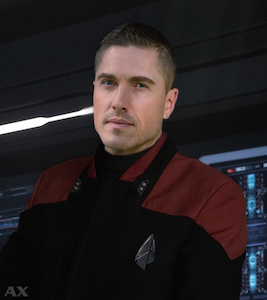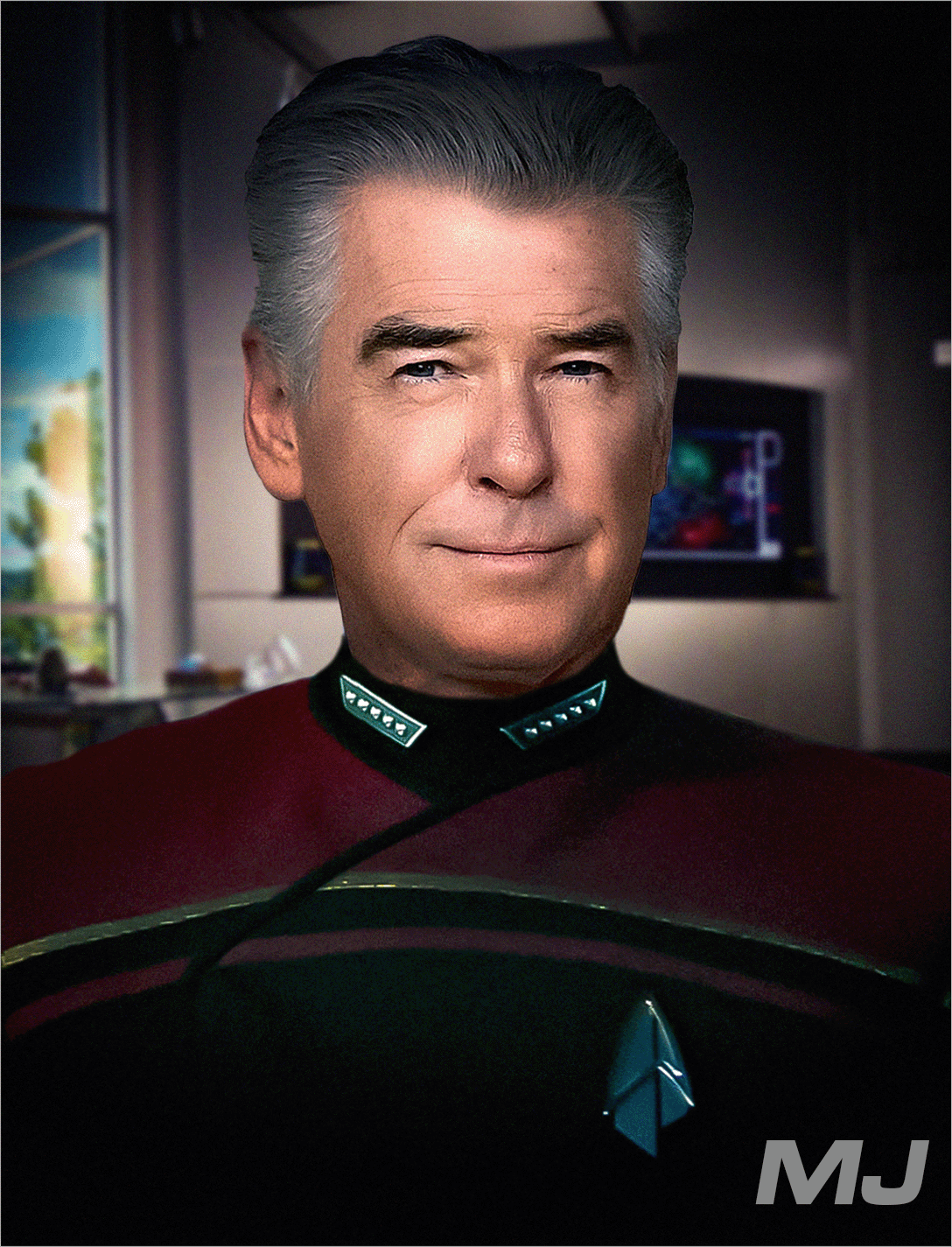The deck still gently hummed underneath as Callahan picked himself up in the gloom of the powerless cockpit. His head ached, but when he put a hand to his temple there was no indication of impact. Being turned head over heels as inertial dampeners stopped him from turning to jam or being rammed against a bulkhead had likely done its own number on him.
“Report?” he tried again, hopeful he’d get more notice of something going wrong than last time. His voice rasped in his throat.
From somewhere in the gloom, the rather shaky voice of Cadet Hargreaves came back. “I don’t know,” she said first. “I – we had to eject the warp core, we…”
“That was then. This is now,” decided Callahan, because it had been a long time since he’d had to think about warp cores. “What’s our status?”
“Uh…” A few unsure bleeps. “Power’s low. Internal or external sensors, sir?”
“Internal. Get me our situation,” he decided after a moment, and didn’t say, let’s first find out if we’re about to blow up.
“Main power is gone,” Katlyn said, though that was rather obvious. “Fusion reactors have shut down as well.” The panel before her was dim and only half of it was displaying anything at all. Low power mode apparently had some rather interesting setting choices about what would and wouldn’t work. “Looks like a safety tripped when the shockwave hit. Batteries are good for now. Parze or Horin, can you…” she cut herself off as rising into view, filling the dim cockpit with light was the unmistakable crescent of a planet. Its apparent motion was a good indicator of the end over end spin that Fantail was in now. “Uh…that could be a problem.”
For a heart-wrenching frozen moment, Cadet Parze watched the dizzying spin through the forward viewport. Scrambling to her feet from the deck, Parze’s scaly snout gawped open in dismay. “Oh no, Katlyn, I should have taken more piloting lessons from–” But her console shrilled at her, as LCARS menu options begged for manual interventions as the environmental systems fully switched to the battery power. After reviewing the options and striking commands into the panel, Parze reported, “Primary life support is functional but —that’s weird— the secondary atmospheric processing unit isn’t responding to diagnostics. Reserve utilities are in the green. Ach, one of the gravity generators has gone dark! I’m compensating with the other.”
“Trying to get impulse engines back online, or at least maneouvring thrusters,” Hargreaves said with audible anxiety as her hands flew across the controls. “Even if all we can do is fall into an orbit, that’s better than, uh, falling…”
“That’s our priority,” Callahan decided, perhaps more easily-led than the most obvious problem than a strict assessment of their situation. He looked about the cadets, considered the limited reading he’d done on them. “Horin, go take a look at our fusion reactors, try to get us something that’s not reserve power,” he decided, sending the young Betazoid below decks. “Parze, figure out what went wrong, but only in terms of how we can fix it; theories and stellar phenomena come later. Mianaai, Hargreaves, get flight systems back online and level us out.” Still unsteady on his feet, he turned to Connolly and dropped his voice. This last part he did not want the cadets to hear, in case the answers would only make them more shaky. “Get to sensor control, short and long-range. Find out if anyone’s out there. This might not have been an accident.”
“How bad can it get?” Connolly grumbled as he made his way through the runabout to sensor control. That was the question Callahan had asked him when they’d been handed this assignment. “Turns out it could get pretty damn bad.” He added as he kneeled down and pulled a hatch off the bulkhead, exposing the sensor controls.
Shaking his head to refocus on what was happening, including trying to block out how everyone was feeling right now from his mind, Horin replied with a simple “aye sir” as he got out of his chair, holding onto some of the hand rails as he moved from the cockpit towards the aft section to access one of the jeffery tubes to go and access the fusion reactors.
A handful of frantic key presses, complaints from the computer summarily addressed and either ignored or resolved, Katlyn brought up the shuttles RCS controls in a rather horrible manual config screen. It looked like an after thought from a programmer who figured it would never be needed, but was there nonetheless, likely for testing purposes. “How old is this?” she asked no one in particular as she selected two of the thruster packages and started firing them cautiously, watching another emergency display which showed the runabouts gyros. “Should have our spin cancelled out in a moment. But if we don’t get impulse back, we’re going to get a lesson on lithobraking. Heck, just the sub space driver coil would help out, but I don’t think it’ll be enough.” She turned look at Nia. “This thing flies like a brick.”
Seated at her console the row back from Katlyn and Nia, Cadet Parze reconfigured her console to add more access to the engineering console within her immediate grasp. The LCARS interface remained sluggish. Every third swipe of her fingertips across the black polymer surface offered no response from the computer. Parze hit the panel harder until heard the satisfying LCARS telltare beeps in reply. “I don’t get it,” Parze said. For the Saurian over-achiever, admitting she didn’t know something sounded like blasphemy out of her mouth, even if engineering wasn’t her specialty. She explained, “The logs look good. The warp core’s self-diagnostics found no hint of any problems– oh. At least, not until ninety seconds before the piloting controls starting acting up. The power transfer conduits to the warp nacelles slipped out of alignment.” Parze scrolled further through the logs hurriedly. “Internal sensor logs aren’t enough to tell me if it was a hardware or software failing. The starboard plasma injector firings dropped to 40 Hz, but the port injector dropped to 25 Hz. With that kind of shear stress, we could have lost one of the nacelles, if we hadn’t ejected the warp core!”
Glancing over her shoulder at Katlyn, Parze continued, “That shouldn’t effect the fuel supply for the impulse engines…” Parze rearranged the displays on her console again, shifting focus to the impulse engines. “I studied this after the Exeter simulation– if you’re not getting enough from the fusion reactor, we… could try injecting a minute amount of antimatter into the impulse reaction chamber? …In an emergency.”
In the back compartment of the Fantail, Horin had rushed to open the tube’s hatch and had almost lurched himself through the tunnel as he climbed in. Crawling into the small space, he had pulled out an engineering kit with him on his sprint to the compartment. Making his way through the tunnel, he eventually came to the next hatch and it didn’t automatically open for him. Cursing under his breath, he pulled his tricorder out to see what the problem was. Straight away, what he had guessed was wrong, was confirmed from the scans. The hatch sensor was offline due to burnt-out circuitry. Grabbing the nearby emergency hand actuator, Horin slammed it onto the hard metal surface to override the door’s magnetic locks. Pushing the actuator to the left after pulling its lever up, he was able to push the door open wide enough for him to see through to the small chamber he was hoping to get to. However instantly he fell backwards after feeling the strong sense of heat coming in his direction. Looking back before him he saw flames all around the fusion reactor chamber.
Tapping his combadge, he called up to the cockpit. “Horin to the cockpit, we have a fire near to fusion reactor control.” He looked around and saw that the emergency suppression system was offline. “Fire suppression system is out too.” He pulled out the extinguisher from his kit and began to douse the flames. Crawling further through he eventually dropped into the small chamber and coughed at the amount of smoke that was in the room. The heat was unbearable but he continued dealing with what was going on around him. Eventually, he took out most of the fire allowing him to access the controls. Tapping away he was able to bring up the status of the fusion reactors. Seeing that three power conduits were offline, he automatically ordered the computer to by-pass them and within seconds of him doing this two of the fusion reactors came online. Again coughing as he tapped his combadge, he called up to the cockpit to report the fusion reactors were back on.
The sensors were dead. It didn’t matter what Connolly tried; he couldn’t bring them back to life. Even if he rerouted every scrap of power the Fantail had left to the sensors, they would still be dead. Frustrated, the young ensign thumped his fist on the control panel several times. He hadn’t expected this to have any effect, but the sensor control panel suddenly sprang to life. Connolly stared at the panel in surprise for a moment, unable to figure out how that had worked, but he didn’t have time to question it. The Fantail didn’t have full power available but enough that he could get the sensors working again. Their range was minimal, but they could see again.
“Let’s see what’s out there,” Connolly muttered as he started scanning the area. The planet ahead of them was class-M, which was a relief, but that wasn’t what Callahan asked him. There was nothing out there, at least nothing that he could see within the limited range of the sensors. There was an odd reading right at the edge of their range, but he couldn’t tell if that was another ship or a sensor ghost caused by the damage suffered by the runabout. Connelly slapped his right hand on his communicator, “Connolly to Callahan. The range is minimal but we have sensors again.”
“Uh, Lieutenant,” Katlyn said, her tone verging on panic, “that planet came up a lot faster than we thought.” The window of the cockpit was already starting to be licked by the orange-red of plasma, tinged slightly with green and blue, as the Fantail‘s bulbous nose pushed through the wispy upper layers of the planet’s atmosphere. If she had more time she’d try and work out the atmospheric composition that would have given those green and blue streaks, but the need to fly the runabout, essentially a prisoner of physics right now, was all-consuming. “Oh crap, oh crap, oh crap.” Her hand went for the ship-wide comm on the flight console, rarely used and possibly not evening working.
“All hands brace for impact!” she shouted.

 Bravo Fleet
Bravo Fleet


















